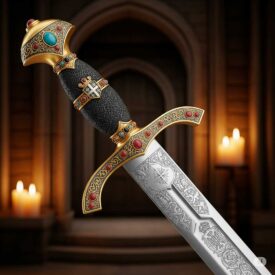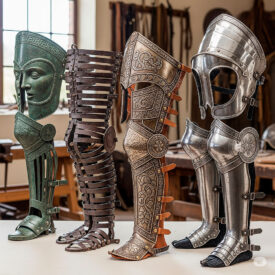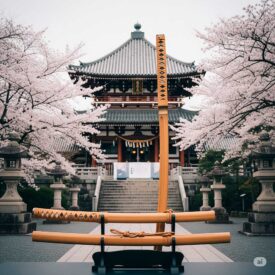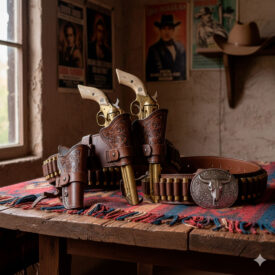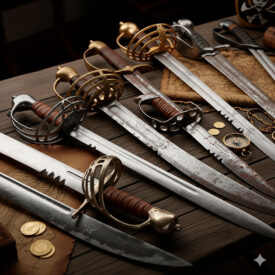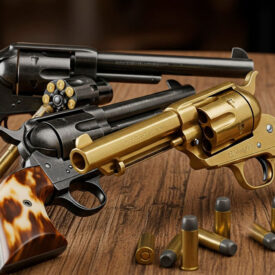How would you feel holding an exact replica of the revolver that defined the Old West or the pistol that changed 20th-century warfare history? That sensation of connecting with the past is the promise fulfilled by Denix replicas: objects that not only imitate forms but also evoke human stories, tactics, and gestures.
Why Denix Replicas Captivate Historians and Collectors
Denix revolver and pistol replicas offer more than just a good finish; they provide a window into specific eras. For a re-enactor or collector, every detail—the curve of the grip, the metal’s patina, the cylinder’s profile—is a piece of the historical puzzle. Denix has made this obsession with detail its hallmark, which is why its pieces are so highly valued in military history, film, and re-enactment communities.
In this article, you will discover:
- The history and evolution of Denix as a replica manufacturer.
- The techniques and materials that ensure realism without lethal functionality.
- Emblematic models and how to choose a replica according to your interest (collection, re-enactment, exhibition).
- Conservation tips and regulations to consider.
History and Milestones of DENIX
| Year | Event |
|---|---|
| 1967 | Operations began in Ciutadella de Menorca, Spain. Founded by José Carretero Febrer and Sebastián Llull Salom, who brought their experience from the costume jewelry sector. |
| 1978 | Transformed into a public limited company and moved production to a new factory in the industrial park of Ciutadella de Menorca. A phase of growth and diversification began, with international expansion to over 40 countries. |
| 2005 | Significant fire that devastated much of the facilities. The company returned to normal in just two months, demonstrating solidity and adaptability. |
| 2016 | Latest factory expansion, reaching a built area of over 3,500 m². |
| Present | Family-owned company with a solid financial position, flexible production structure, and clear export vocation, aiming to consolidate itself as a European leader in its category. Investments made to improve product quality, productivity, and occupational safety, and development of multiple digital communication channels. |
Technique and Materials: How Denix Achieves Realism Without Functionality
The big question for enthusiasts is: how do you make a replica look authentic without being an operational weapon? Denix combines industrial processes with manual finishes. It uses metal castings, controlled patinas, and wood simulations to achieve plausible textures. The result is a piece that weighs, feels, and looks like the original, but with canceled mechanisms or designs that prevent its use as a weapon.
This allows replicas to be safe for exhibition, props, and historical re-enactment, always respecting current regulations and common-sense precautions.
Denix Replicas: Catalog and Emblematic Models
The Denix catalog ranges from 18th-century flintlock pistols to 20th-century revolvers and automatics. Each model points to a different narrative: aristocratic duels, naval battles, the grit of the trenches, or the dust of the American West. Below, we explore the replica groups that attract the most attention.
Quick classification:
- Flintlock and dueling pistols: pieces for lovers of the Napoleonic era and the 18th century.
- Western revolvers: icons like the Peacemaker that defined a cultural aesthetic.
- Modern warfare pistols: Luger, 1911, and 20th-century models, frequent in World War I and World War II re-enactments.
To move beyond words, observe a classic replica that Denix reproduces with fidelity: the revolver that evoked legends of the West, with a revolving cylinder and grip details that echo original 19th-century pieces.
Representative Models and Their Historical Significance
Choose a replica for its history: the Peacemaker represents the transition between order and the frontier; the Colt 1911 symbolizes modernity on the battlefield; the Luger P08 speaks of tactical changes in industrial warfare. Each model provides context to a specific era and facilitates a material understanding of history.
Quick Comparison: Three Iconic Replicas
| Model | Era | Original Features | Denix Replica Features |
|---|---|---|---|
| Peacemaker (Single Action Army) | Late 19th century | Revolving cylinder, single action, various barrel lengths | Identical cylinder and grip details, weight close to original, deactivated mechanism |
| Colt 1911 | Early 20th century | Semi-automatic pistol, reliable design, used in world conflicts | Metal and wood finishes, slide and safety simulation, non-operational |
| Luger P08 | First half 20th century | Ergonomic and distinctive design, used in European wars | Replica with patina and simulated movable parts, barrel obstructed for safety |
From Manufacturing to Display Case: Processes That Matter
The process begins with documentation: blueprints, photographs, and, when possible, access to original pieces. From there, molds and castings are made. The finishes, often applied by hand, include patinas, browning, and aging simulations that provide visual authenticity.
Finally, the pieces undergo safety controls: locked mechanisms, closed barrels or designs that prevent the insertion of real ammunition. This balance between appearance and safety is the key to Denix’s success.
How to Choose the Right Replica for Your Purpose
Each collector has a different motivation: some seek museum authenticity, others scenic utility, and still others the pleasure of displaying evocative pieces. These questions will help you decide:
- Are you looking for visual authenticity to detail? Prioritize pieces with manual finishes and realistic weight.
- Will you use it in re-enactment or theater? Choose models with simulated mechanisms and finishes resistant to handling.
- What size and profile fits into your display case? Consider length, weight, and general aesthetics.
A Denix replica usually includes weight and dimension specifications; if tactile realism is important to you, pay attention to these details before deciding.
Conservation, Display, and Safety
A well-preserved replica ages gracefully. General recommendations:
- Store in a dry and ventilated area.
- Clean dust with soft cloths and avoid corrosive agents.
- Keep screws and simulated mechanisms lightly oiled to prevent stiffness.
- Avoid displaying replicas in places where they might be mistaken for real weapons in public spaces without the appropriate context.
Remember that, while they are decorative objects, replicas can cause alarm if displayed without context. Discretion and compliance with local regulations are essential.
Historical and Educational Value of Replicas
A well-made replica does not replace an original in terms of patrimonial value, but it does fulfill an irreplaceable educational function: it allows an object to be handled, studied, and displayed without endangering unique pieces. For museums, interpretation centers, and history schools, these replicas facilitate a sensory experience that texts do not offer.
In the hands of a teacher or guide, a Denix revolver can become a tool to illustrate technological processes, combat tactics, the evolution of armament design, and the relationship between society and armed violence.
The Community Around Denix: Re-enactors, Collectors, and Film
Denix has generated an active community: from Wild West re-enactment groups to filmmakers looking for accurate pieces for shoots. Sharing experiences with other collectors helps identify good reproductions, detect fakes, and highlight specific pieces.
Additionally, Denix pieces are often subject to aesthetic restorations that extend their life in display cases and locations.
Legal Aspects and Collector’s Responsibility
Although the sale of Denix replicas adheres to free trade legal frameworks, each country or region may have specific rules regarding their display and transport. Therefore, it is advisable to be informed and act with common sense: avoid transporting them in public without packaging or documentation and do not display pieces in contexts that could generate public alarm.
Denix insists that its replicas are decorative or collectible items and do not constitute functional weapons; this distinction is the basis of their design and regulatory compliance.
Brief Guide to Starting Your Collection
If you are new to collecting, follow these steps to build a coherent and safe collection:
- Define a thematic axis: era, conflict, typology (revolvers, dueling pistols, automatics).
- Prioritize pieces with documentation: technical sheets and photographs help verify historical accuracy.
- Take care of storage: avoid humidity and contact with corrosive agents.
- Relate pieces: a display case with a Peacemaker revolver, a Colt 1911, and a flintlock pistol tells a richer story than loose pieces.
With patience and discernment, a collection can become a visual narration of eras and techniques.
A Closing That Opens Curiosity
Holding a Denix replica is more than admiring an object: it’s feeling the pulse of an era, understanding technical decisions, and recognizing the role of weapons in shaping historical narratives. If you are passionate about re-enactment, material history, or collecting, these pieces offer a bridge between the past and contemporary storytelling.
VIEW MORE DENIX PRODUCTS | VIEW MORE REVOLVERS | VIEW MORE FIREARM REPLICAS





